 Petzlover
Petzlover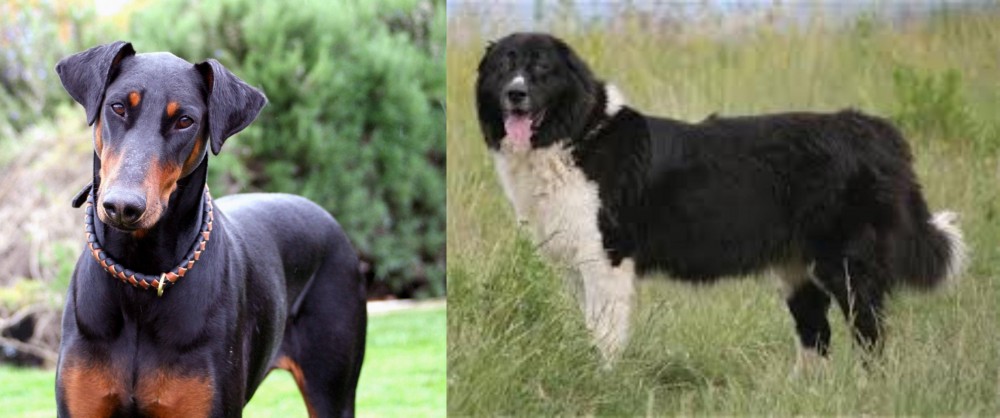 Doberman Pinscher is originated from Germany but Bulgarian Shepherd is originated from Bulgaria. Both Doberman Pinscher and Bulgarian Shepherd are having almost same height. Doberman Pinscher may weigh 12 kg / 26 pounds lesser than Bulgarian Shepherd. Doberman Pinscher may live 46 years less than Bulgarian Shepherd. Both Doberman Pinscher and Bulgarian Shepherd has same litter size. Doberman Pinscher requires Low Maintenance. But Bulgarian Shepherd requires Moderate Maintenance
Doberman Pinscher is originated from Germany but Bulgarian Shepherd is originated from Bulgaria. Both Doberman Pinscher and Bulgarian Shepherd are having almost same height. Doberman Pinscher may weigh 12 kg / 26 pounds lesser than Bulgarian Shepherd. Doberman Pinscher may live 46 years less than Bulgarian Shepherd. Both Doberman Pinscher and Bulgarian Shepherd has same litter size. Doberman Pinscher requires Low Maintenance. But Bulgarian Shepherd requires Moderate Maintenance
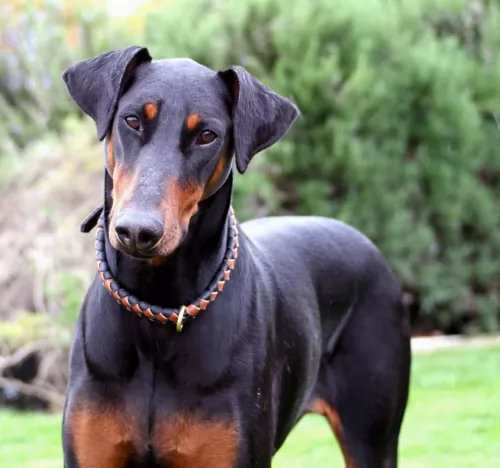 The origin of Doberman is Apolda, in Germany in 1890. It was officially recognized as a breed in 1900. The name originally called as Thuringer pinscher or Plizeilichi and the peer was renamed as DOBERMAN PINSCHER in 1899.American Kennel Club recognized DOBERMAN PINSCHER in 1908. The German tax collector called Karl friedrich developed Doberman.
The origin of Doberman is Apolda, in Germany in 1890. It was officially recognized as a breed in 1900. The name originally called as Thuringer pinscher or Plizeilichi and the peer was renamed as DOBERMAN PINSCHER in 1899.American Kennel Club recognized DOBERMAN PINSCHER in 1908. The German tax collector called Karl friedrich developed Doberman.
He developed a breed that would be able to protect him from his surroundings and from his neighborhoods. This Dober also ran as a local animal shelter and approch many dogs for his breeding program. But karl did not kept any proper records or document for this breeds origin. Dobeis are also found through United States, Russia and South Africa.
 The Bulgarian Shepard Dog comes from the ancient line of Molossers of Central Asia and Tibet, and the shepherds of the Balkans, Turkey and Caucasus. Among the oldest and most valued of the working dogs of Europe, the Bulgarian Shepherd breed was created by mixing the Balkan breeds with the dogs from Central Asia by the proto-Bulgarians around the 7th century. The Karakachanskoto Kuche was introduced to Bulgaria and accepted by the sheep herders. Mixing this breed in with the Balkan and Central Asian mix developed the Bulgarian Shepherd we know today. In the long run the original Karakachanskoto Kuche became extinct, replaced entirely by the Bulgarian Shepherd even in places where the new breed is still called by the Kuche name. Although the breeds are not the same, most of the dog world does not know the difference.
The Bulgarian Shepard Dog comes from the ancient line of Molossers of Central Asia and Tibet, and the shepherds of the Balkans, Turkey and Caucasus. Among the oldest and most valued of the working dogs of Europe, the Bulgarian Shepherd breed was created by mixing the Balkan breeds with the dogs from Central Asia by the proto-Bulgarians around the 7th century. The Karakachanskoto Kuche was introduced to Bulgaria and accepted by the sheep herders. Mixing this breed in with the Balkan and Central Asian mix developed the Bulgarian Shepherd we know today. In the long run the original Karakachanskoto Kuche became extinct, replaced entirely by the Bulgarian Shepherd even in places where the new breed is still called by the Kuche name. Although the breeds are not the same, most of the dog world does not know the difference.
In Bulgaria however the Karakachan is a national treasure and the history of the breed runs deep. One Kuche could run up to 1200 animals and hundreds were used by the herdsmen in the mountains of Bulgaria. There were many regional types of Bulgarian Shepherds with very little difference between those types. These dogs were so prized by the shepherds that the dogs ate first before the people. The dogs however ate a vegetarian diet of milk, wheat, water and oats. The Bulgarian Shepherd lives a long life of often over 20 years. The Bulgarian Army made good use of these dogs early in the 20th century.
Following World War II, the wolves were close to extinction and property in Bulgaria was nationalized. There was no longer a need for a large force of working dogs. The Communist government exterminated large numbers of sheep dogs including the Bulgarian Shepherd. Only those species on government owned farms and in remote regions survived. When the government farms were disbanded in the early 20th century, these dogs were exterminated as well. Only those in the mountains survived. Commercial breeding of the Bulgarian Shepherd in the end of the century has resulted in controversy as other breeds came into the breeding program.
Use of breeds such as Sarplaninacs, Caucasian Ovcharkas, St. Bernards, Central Asian Ovcharkas and Bosnian Tornjaks in these programs resulted in Bulgarian Shepherd or Karakachans that were a lot different from the original breed. There is therefore some concern about the future of the breed in Bulgaria, yet they received official Bulgarian national recognition in 2000. Today’s Bulgarian Shepherd is a guard dog for both property and livestock.
The official standard for the breed came about in 1991 and in 2005 it was recognized by the Bulgarian State Commission for Animal Breeds. Only those dogs that meet this standard are considered “true” Karakachans. The Bulgarian Shepherds are willing to fight bears and wolves in defense of its family and flock. The dog is brave and loyal, dignified and powerful. They are recognized by both the Dog Registry of America, Inc. (DRA) and the Bulgarian Republican Federation of Cynology (BRFC) a member of the FCI.
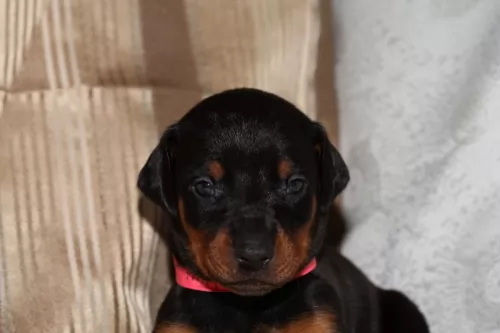 Dobermans are certainly shorthaired mixed –breed shepherd dogs, this kind of dogs are chosen only for their intelligent, sound and endure. This breed is best in attitude and appearance, and now it is found in world wide. Dobermans are highly intelligent and fast runners. So mostly dobers are only suited for Police, Army and Guard works. Dobies are also used as guide dogs for the blind.
Dobermans are certainly shorthaired mixed –breed shepherd dogs, this kind of dogs are chosen only for their intelligent, sound and endure. This breed is best in attitude and appearance, and now it is found in world wide. Dobermans are highly intelligent and fast runners. So mostly dobers are only suited for Police, Army and Guard works. Dobies are also used as guide dogs for the blind.
They are very elegant in appearance. Dobies are watchful, determined, energetic, fearless, obedient, alert and loyal. Dobies are short coat so it is easy for care. Brushing regularly can avoid shedding at home. They have almond shaped eyes, they have long narrow heads. The Doberman ears are often cropped but many of the owners like dobers by their nature. Dobers looking was always like a graceful giant.
 A massive, powerful and muscular Molosser, the Bulgarian Shepherd is strong, agile, powerful and fast. They are intelligent and reliable. They have a long, thick, harsh coat in white with patches of black. Their skull is massive and broad with a furrowed forehead. The muzzle is massive as well while the nose has wide nostrils and is fairly large. It has close fitting, thick lips with strong, scissor bite jaws. The Bulgarian Shepherd’s eyes are deep, oblique and small. They are either hazel or dark. They have an intelligent and confident, yet firm almost grim expression.
A massive, powerful and muscular Molosser, the Bulgarian Shepherd is strong, agile, powerful and fast. They are intelligent and reliable. They have a long, thick, harsh coat in white with patches of black. Their skull is massive and broad with a furrowed forehead. The muzzle is massive as well while the nose has wide nostrils and is fairly large. It has close fitting, thick lips with strong, scissor bite jaws. The Bulgarian Shepherd’s eyes are deep, oblique and small. They are either hazel or dark. They have an intelligent and confident, yet firm almost grim expression.
Their ears are low set, small and v-shaped. They sit close to the head which sits on a powerful but short neck. They have a broad back, well-muscled body with a deep chest and long, rough tail. Their gait is a trot with a spring in their step. There are two types of coats – longhaired and shorthaired with no undercoats.
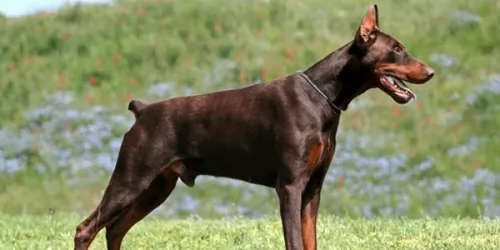 Dobermans are individual in personalities. Some dogs are friendly and outgoing; some Dobies are reserved and shy. Some will be more dominant with other dogs it used to chase small dogs and cats. Most of the dobers are soft in character and love companionship with people.
Dobermans are individual in personalities. Some dogs are friendly and outgoing; some Dobies are reserved and shy. Some will be more dominant with other dogs it used to chase small dogs and cats. Most of the dobers are soft in character and love companionship with people.
Dobers have high energy level and it requires a lot of exercise in order to avoid harmful behavior to others. We should keep them interested because intelligent dogs are easily got bored. They mostly enjoys only in outing because they will be happy with the people who walks, runs and in bike riding.
When learning new things they are the best. Dobermans are not able to be a lazy. For many years dobers are the only dogs being excellent as police dogs. Because they are highly active in nature so they are interested in new this for learning.
Dobers are apartment adaptable dogs. They used to bark but are close and friendly to people. At the same time we have to train dobers to welcome the guest also.
 This is a working dog, intelligent and independent guard dog. Reserved around strangers but loyal and devoted with his family. Tolerant of children in their family if they were raised with them. Not only will she defend human family members, she will guard and defend household pets as well. He is quite capable of making her own independent decisions. These are very intense guard dogs that will respond aggressively if they think their people are being attacked.
This is a working dog, intelligent and independent guard dog. Reserved around strangers but loyal and devoted with his family. Tolerant of children in their family if they were raised with them. Not only will she defend human family members, she will guard and defend household pets as well. He is quite capable of making her own independent decisions. These are very intense guard dogs that will respond aggressively if they think their people are being attacked.
 The breed itself is known to be healthy but they do face some of the usual health issues of the massive, giant breeds. This includes knee and elbow dislocation; hip dysplasia; bloat; entropion and osteosarcoma. All of these conditions require medical intervention, but bloat and osteosarcoma are the deadliest. Bloat needs immediate attention and osteosarcoma is a deadly bone cancer.
The breed itself is known to be healthy but they do face some of the usual health issues of the massive, giant breeds. This includes knee and elbow dislocation; hip dysplasia; bloat; entropion and osteosarcoma. All of these conditions require medical intervention, but bloat and osteosarcoma are the deadliest. Bloat needs immediate attention and osteosarcoma is a deadly bone cancer.
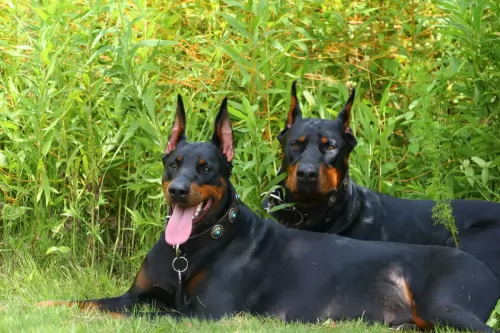 Dobers are mostly come in black, blue, red or fawn. Dobers are low maintenance for grooming. They were clean dogs because they never make a strong dog odor. Using brush in dobers hair for once per week reduces hair fall control. Dobers are not requiring frequent bathing most of the owners are getting bath for 3 or 4 times per year in grooming.
Dobers are mostly come in black, blue, red or fawn. Dobers are low maintenance for grooming. They were clean dogs because they never make a strong dog odor. Using brush in dobers hair for once per week reduces hair fall control. Dobers are not requiring frequent bathing most of the owners are getting bath for 3 or 4 times per year in grooming.
You can feed your puppy 2-3 small meals per day until it was 4 months old. And then have to decrease one meal and two for a day. And often you should not keep food and leave food sitting out all the time. Then after six months needs to stop feeding much vitamins and minerals because it leads a several health problems in his muscle and joints.
This type of dogs should not be tied up alone outside, because it should be manifest itself by barking chewing. The people who are working for a long time should not be adopting this type of dogs. Naturally dobers are well protective to our home and people. At the same time small children must be supervised. At the same time if we are not strict, dobers would be get out of our hand.
 These are large dogs with large appetites, but you want to keep them lean and active. Feed them at least twice a day with a high quality large or giant dog dry food. Four to five cups of food per day is the maximum.
These are large dogs with large appetites, but you want to keep them lean and active. Feed them at least twice a day with a high quality large or giant dog dry food. Four to five cups of food per day is the maximum.
Patellar Luxation – a floating kneecap or dislocated knee. Will cause lameness.
Osteosarcoma – bone cancer must be treated immediately as it is potentially fatal.
The Bulgarian Shepherd needs a good amount of exercise every day. Remember this is a working breed and they need a job. Long walks every day are essential for his well-being.